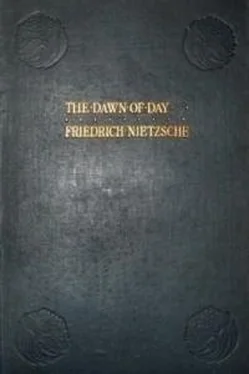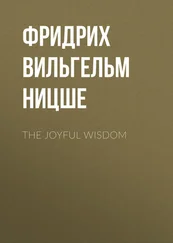561.
LETTING OUR HAPPINESS ALSO SHINE.—In the same way as painters are unable to reproduce the deep brilliant hue of the natural sky, and are compelled to use all the colours they require for their landscapes a few shades deeper than nature has made them—just as they, by means of this trick, succeed in approaching the brilliancy and harmony of nature’s own hues, so also must poets and philosophers, for whom the luminous rays of happiness are inaccessible, endeavour to find an expedient. By picturing all things a shade or two darker than they really are, their light, in which they excel, will produce almost exactly the same effect as the sunlight, and will resemble the light of true happiness.—The pessimist, on the other hand, who paints all things in the blackest and most sombre hues, only makes use of bright flames, lightning, celestial glories, and everything that possesses a glaring, dazzling power, and bewilders our eyes: to him light only serves the purpose of increasing the horror, and of making us look upon things as being more dreadful than they really are.
562.
THE SETTLED AND THE FREE.—It is only in the Underworld that we catch a glimpse of that gloomy background of all that bliss of adventure which forms an everlasting halo around Ulysses and his like, rivalling the eternal phosphorescence of the sea,—that background which we can never forget: the mother of Ulysses died of grief and yearning for her child. The one is driven on from place to place, and the heart of the other, the tender stay–at–home friend, breaks through it—so it always is. Affliction breaks the hearts of those who live to see that those whom they love best are deserting their former views and faith,—it is a tragedy brought about by the free spirits,—a tragedy which, indeed, occasionally comes to their own knowledge. Then, perhaps, they too, like Ulysses, will be forced to descend among the dead to get rid of their sorrow and to relieve their affliction.
563.
THE ILLUSION OF THE MORAL ORDER OF THE UNIVERSE.—There is no “eternal justice” which requires that every fault shall be atoned and paid for,—the belief that such a justice existed was a terrible delusion, and useful only to a limited extent; just as it is also a delusion that everything is guilt which is felt as such. It is not the things themselves, but the opinions about things that do not exist, which have been such a source of trouble to mankind.
564.
BY THE SIDE OF EXPERIENCE.—Even great intellects have only a hand–breadth experience—in the immediate proximity of this experience their reflection ceases, and its place is taken by unlimited vacuity and stupidity.
565.
DIGNITY AND IGNORANCE.—Wherever we understand we become amiable, happy, and ingenious; and when we have learnt enough, and have trained our eyes and ears, our souls show greater plasticity and charm. We understand so little, however, and are so insufficiently informed, that it rarely happens that we seize upon a thing and make ourselves lovable at the same time,—on the contrary we pass through cities, nature, and history with stiffness and indifference, at the same time taking a pride in our stiff and indifferent attitude, as if it were simply due to superiority. Thus our ignorance and our mediocre desire for knowledge understand quite well how to assume a mask of dignity and character.
566.
LIVING CHEAPLY.—The cheapest and most innocent mode of life is that of the thinker; for, to mention at once its most important feature, he has the greatest need of those very things which others neglect and look upon with contempt. In the second place he is easily pleased and has no desire for any expensive pleasures. His task is not difficult, but, so to speak, southern; his days and nights are not wasted by remorse; he moves, eats, drinks, and sleeps in a manner suited to his intellect, in order that it may grow calmer, stronger, and clearer. Again, he takes pleasure in his body and has no reason to fear it; he does not require society, except from time to time in order that he may afterwards go back to his solitude with even greater delight. He seeks and finds in the dead compensation for the living, and can even replace his friends in this way—viz., by seeking out among the dead the best who have ever lived.—Let us consider whether it is not the contrary desires and habits which have made the life of man expensive, and as a consequence difficult and often unbearable. In another sense, however, the thinker’s life is certainly the most expensive, for nothing is too good for him; and it would be an intolerable privation for him to be deprived of the best.
567.
IN THE FIELD.—“We should take things more cheerfully than they deserve; especially because for a very long time we have taken them more seriously than they deserved.” So speak the brave soldiers of knowledge.
568.
POET AND BIRD.—The bird Phœnix showed the poet a glowing scroll which was being gradually consumed in the flames. “Be not alarmed,” said the bird, “it is your work! It does not contain the spirit of the age, and to a still less extent the spirit of those who are against the age: so it must be burnt. But that is a good sign. There is many a dawn of day.”
569.
TO THE LONELY ONES.—If we do not respect the honour of others in our soliloquies as well as in what we say publicly, we are not gentlemen.
570.
LOSSES.—There are some losses which communicate to the soul a sublimity in which it ceases from wailing, and wanders about silently, as if in the shade of some high and dark cypresses.
571.
THE BATTLE–FIELD DISPENSARY OF THE SOUL.—What is the most efficacious remedy?—Victory.
572.
LIFE SHALL COMFORT US.—If, like the thinker, we live habitually amid the great current of ideas and feelings, and even our dreams follow this current, we expect comfort and peacefulness from life, while others wish to rest from life when they give themselves up to meditation.
573.
CASTING ONE’S SKIN.—The snake that cannot cast its skin perishes. So too with those minds which are prevented from changing their views: they cease to be minds.
574.
NEVER FORGET!—The higher we soar the smaller we appear to those who cannot fly.
575.
WE AERONAUTS OF THE INTELLECT.—All those daring birds that soar far and ever farther into space, will somewhere or other be certain to find themselves unable to continue their flight, and they will perch on a mast or some narrow ledge—and will be grateful even for this miserable accommodation! But who could conclude from this that there was not an endless free space stretching far in front of them, and that they had flown as far as they possibly could? In the end, however, all our great teachers and predecessors have come to a standstill, and it is by no means in the noblest or most graceful attitude that their weariness has brought them to a pause: the same thing will happen to you and me! but what does this matter to either of us? Other birds will fly farther! Our minds and hopes vie with them far out and on high; they rise far above our heads and our failures, and from this height they look far into the distant horizon and see hundreds of birds much more powerful than we are, striving whither we ourselves have also striven, and where all is sea, sea, and nothing but sea!
And where, then, are we aiming at? Do we wish to cross the sea? whither does this over–powering passion urge us, this passion which we value more highly than any other delight? Why do we fly precisely in this direction, where all the suns of humanity have hitherto set? Is it possible that people may one day say of us that we also steered westward, hoping to reach India—but that it was our fate to be wrecked on the infinite? Or, my brethren? or—?
Читать дальше











